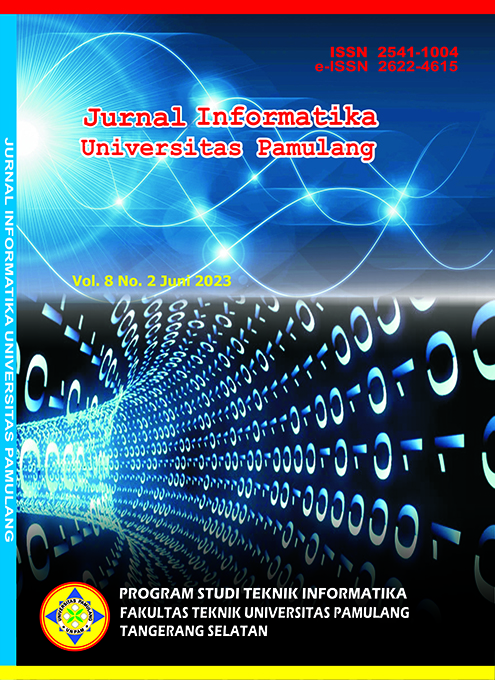Implementasi Perangkat Next Generation Firewall untuk Melindungi Aplikasi dari Serangan Malware
DOI:
https://doi.org/10.32493/informatika.v8i2.33656Keywords:
Cybercrime, Next Generation Firewall, Malware, Paloalto, TestingAbstract
Based on the rapid development of technology, which has positive and negative impacts, one of the negative impacts is data leakage, called cybercrime. This is very dangerous and causes huge losses. In addition, the most commonly found cybercrimes are malware threats, phishing, DDoS, and others. In this study, the implementation of the Paloalto firewall is carried out by configuring the firewall, as is the attack testing stage using malware such as Eicar, ransomware, Trojans, Dos, and web filtering. The results of this test aim to prevent the risk of data loss, material loss, and the paralysis of public services. And to be efficient and effective in scanning for a variety of attacks without affecting network performance. The implications of the results found are expected to solve the problem at hand perfectly. NGFW performs prevention by blocking access to malware that enters its network traffic. This research also implements NGFW, where firewall configuration is carried out, namely by creating a rule policy on the firewall. In this study, an evaluation of network performance was carried out after the implementation of NGFW and firewall configuration. The results show that the use of NGFW and rule policies on firewalls can improve network security efficiently and effectively. It is hoped that these results can overcome the paralysis of public services due to malware attacks and improve network performance.
References
Almeida, P. R. (2021). Next-Generation Firewall Concept, Features, and Their . no. doi: 10.31112/kriativ-tech-2021-.
Khalisah, A. M., & Kirana, P. (2022). Implementasi Norma Hukum Terhadap Tindak Pidana Peretasan (Hacking) di Indonesia. Jurist-Diction, 5(6), 2117–2132. https://doi.org/10.20473/jd.v5i6.40073
Pengamanan Sistem Jaringan Komputer Dengan Teknologi Firewall I Gede Suputra Widharma and The A Team. (n.d.).
https://www.researchgate.net/publication/346965331
Ramos Brandao, P., & Almeida, J. (2021). Next-Generation Firewalls: Concept, Features, and Their Benefits. https://doi.org/10.31112/kriativ-tech-2021-10-59
Yasin, M. A. (n.d.). Respon Insiden dan Deteksi Terhadap Zero-Day.
Jr, R. M. (2008). Keamanan sistem ionformasi. Sistem Informasi Salemba.
Kirana, A. M. (2022). Implementasi Norma Hukum Terhadap Tindak Pidana Peretasan (Hacking) di Indonesia.
Labone, M. (2020). Anomaly-based network intrusion detection using machine learning, . Institut polytechnique de Paris.
Sitorus, V. P. (2022). Nunukan State Court’s Computer Network Security Improvement Using Centralized Next-Generation Firewall, Budapest International Research and Critics .
Team, I. G. (2021). Pengamanan Sistem Jaringan Komputer Dengan Teknologi Firewall.
Ramos Brandao, P., & Almeida, J. (2021). Next-Generation Firewalls: Concept, Features,
Downloads
Published
Issue
Section
License
Authors who publish with this journal agree to the following terms:
- Authors retain copyright and grant the journal right of first publication with the work simultaneously licensed under a Creative Commons Attribution-NonCommercial 4.0 International (CC BY-NC 4.0) that allows others to share the work with an acknowledgement of the work's authorship and initial publication in this journal.
- Authors are able to enter into separate, additional contractual arrangements for the non-exclusive distribution of the journal's published version of the work (e.g., post it to an institutional repository or publish it in a book), with an acknowledgement of its initial publication in this journal.
- Authors are permitted and encouraged to post their work online (e.g., in institutional repositories or on their website) prior to and during the submission process, as it can lead to productive exchanges, as well as earlier and greater citation of published work (See The Effect of Open Access).
Jurnal Informatika Universitas Pamulang have CC-BY-NC or an equivalent license as the optimal license for the publication, distribution, use, and reuse of scholarly work.
In developing strategy and setting priorities, Jurnal Informatika Universitas Pamulang recognize that free access is better than priced access, libre access is better than free access, and libre under CC-BY-NC or the equivalent is better than libre under more restrictive open licenses. We should achieve what we can when we can. We should not delay achieving free in order to achieve libre, and we should not stop with free when we can achieve libre.
Jurnal Informatika Universitas Pamulang is licensed under a Creative Commons Attribution-NonCommercial 4.0 International (CC BY-NC 4.0)
YOU ARE FREE TO:
- Share : copy and redistribute the material in any medium or format
- Adapt : remix, transform, and build upon the material for any purpose, even commercially.
- The licensor cannot revoke these freedoms as long as you follow the license terms





